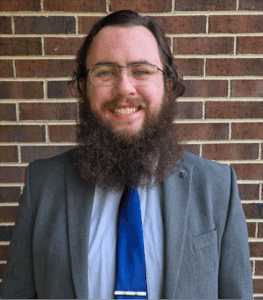Behind the Scenes: Meet the Coordinator Helping Online Students Navigate Their Educational Journey
Student Success Coordinator Keilan Coleman on Faith, Perseverance and Supporting Online Learners at HCU
Keilan Coleman doesn’t fit the typical mold of an academic advisor. The student success coordinator for HCU’s online education and kinesiology graduate programs brings a unique blend of military upbringing, Orthodox Christian faith, and personal understanding to his role helping students navigate the sometimes overwhelming transition to online education.
Growing up as the oldest of five children in a military family, Coleman moved frequently across multiple states and even Germany before eventually settling at Liberty University, where he graduated in 2020 and met his wife. His multicultural background—his mother from Northern France and his father from San Antonio—has given him a broad perspective on the diverse students he now serves.
Finding Purpose Through Student Connection
Today, Coleman balances his professional responsibilities with family life, active involvement in his local Orthodox Christian parish, fitness goals, and hobbies including gaming, reading, and martial arts. But it’s his work with students that seems to energize him most.
“I have had a few students figure out what they are aiming for with their program,” Coleman explains when asked about the most rewarding aspects of his job. “I rather enjoy helping students sort that out, as it gives them a goal to work towards, and eliminates some confusion.”
His role as a student success coordinator encompasses registration, planning, and answering the endless stream of questions that come with online education. “Most of my job focuses around helping students get the resources they need, or providing that assistance myself,” he says.
Advice for the Undecided and Returning Learner
Coleman has particular empathy for students struggling to find their direction—perhaps because he’s been there himself. “I definitely connect with young people trying to figure out what they want to do,” he admits. “It took me a good semester or two to figure out what I wanted to do for my undergraduate degree. Even after I was nearing the end, I ended up not pursuing what I got a degree in.”
For adult learners returning to school after time in the workforce, his advice is pragmatic: “Feel it out and ease themselves into it. There is no need, generally, to go full force and either burn out or not do well in classes. Learn what you are capable of and operate within those limits.”
He notes that HCU’s semester structure supports this measured approach, making it relatively easy for students to create schedules that allow them to transition gradually into their programs.
Faith as the Foundation
When asked how he manages the emotional weight of processing hundreds of applications from people with real dreams and struggles, Coleman points to his faith tradition. “Normally I handle it with steady work and steady church involvement and attendance,” he says. “Although sometimes I will say a prayer or ask for an intercession from my patron saint when the going gets rather stressful or exhausting.”
 He cites his parish community as one of the most formative influences in his life. “The efforts of my priest, and that community, has brought me much for the development of my faith,” Coleman reflects. “That generally translates into my way of handling students with general directness and peace.”
He cites his parish community as one of the most formative influences in his life. “The efforts of my priest, and that community, has brought me much for the development of my faith,” Coleman reflects. “That generally translates into my way of handling students with general directness and peace.”
The Students Who Inspire Him
Among the many applications and student stories he encounters, Coleman finds particular inspiration in doctoral students balancing multiple responsibilities. “I have seen a few students come through and just focus on getting their doctoral program done despite their various responsibilities,” he notes. “Those are normally the ones who I find inspiring. They show that sometimes, you just have to put your nose to the grindstone.”
Despite the challenges of online education—particularly for students feeling disconnected from campus life—Coleman emphasizes the accessibility of support at HCU. “To be honest, the faculty leadership is pretty heavily involved and always willing to talk with students,” he says, adding that online resources like tutoring and spiritual life programs remain available even for out-of-state students.
A Message of Solidarity
If Coleman could gather all the students he’s worked with in one room, his message would be one of shared experience. “I would like them to realize that they generally have similar concerns,” he observes. “It is very rare I find a truly unique struggle. And even in those, there are similarities still.”
His hopes for HCU students are straightforward: “I hope they can get good grades and graduate and use their degree! Something I am sure they want as well.” But beyond academic success, he wishes for something deeper—that students can achieve their goals “with minimal interventions of accidents and danger from their day-to-day life.”
And his message to the online team’s students? “We want things to be as smooth as possible for them. Chaos for them is chaos for us, and nobody enjoys that.”
Words to Live By
When asked what wisdom he’d share from his own journey, Coleman’s response is characteristically concise: “Hold and keep at it. Diligence is a virtue.” 
It’s a philosophy that reflects both his Orthodox Christian faith and his practical approach to education—one that acknowledges the struggle while encouraging persistence. For the hundreds of students navigating their own educational journeys with Coleman’s guidance, it’s a reminder that success often comes not from dramatic breakthroughs, but from steady, faithful effort.






